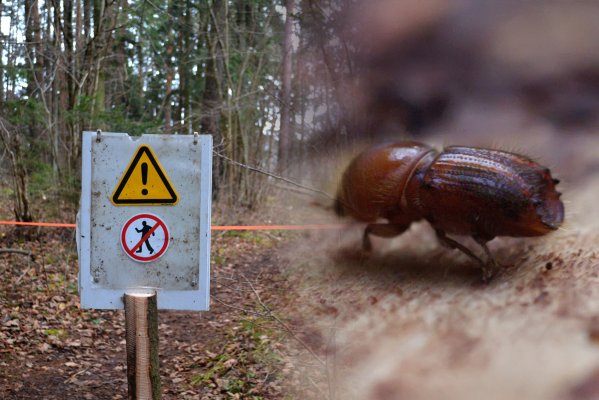LVM and Authorities to Limit the Spread of the Bark Beetle in the Vicinity of Lake Melnezers
On 4 December, people could hear the sound of chainsaws working hard in a forest near Lake Melnezers near Tukums to free the area of recreation that is so popular among locals from dangerous trees that have been damaged by bark beetles. Representatives of JSC “Latvia’s State Forests” (LVM), the State Forest Service (SFS) and Tukums Municipality Council met in the forest to inspect the start of the logging works and gain an understanding of the overall planned felling volumes.
“Already at the beginning of November, LVM with the support of the local government, informed the public about the planned sanitary felling and forest tending works in an area of 26 hectares that are to be carried out in order to limit the spread of the European spruce bark beetle and prevent danger to visitors. In the sanitary felling near Lake Melnezers, it is planned to cut down and remove damaged spruces, as well as dangerous trees along roads and paths,” tells Jānis Zitāns, LVM Zemgale Region Forest Management Planning Manager.
The territory around Lake Melnezers, which is so popular among residents of Tukums for recreation in nature, is located in Engure Municipality. Therefore, the representatives of Tukums Municipality Council are interested in the safety and tidiness of the surroundings. “The safety of people and the cleanliness of the forest are important to us, because we understand that by allowing the bark beetle to continue to spread here, all the trees may have to be cut down within a few years. We therefore need to reduce the risks in order to maintain this local holiday destination. We trust LVM professionals who know what they are doing,” says Agris Zvaigzneskalns, Deputy Chairman of Tukums Municipality Council.
In the photo: Jānis Naglis, manager of logging works
Logging works in the forest around Lake Melnezers are performed by LLC “Stiga MR”; company`s manager Jānis Naglis talked about the planned works: “With chainsaws, we develop a sanitary selective felling, in which we remove both trees damaged by bark beetles and also dangerous trees that have been broken by wind. Is there a question as to whether we should cut trees here or not? We can compare this situation with Covid 19 – if you did not isolate the sick people, all the people around them would get infected. It is similar with trees: if we do not cut down the trees that are infested by the bark beetle, they will also infect the other healthy trees growing nearby and the damage will be even greater. Another important factor in favour of logging is the prevention of danger, because there are many damaged and old trees in this forest that can be broken down in strong winds, it is like a time bomb. Once we have cut down these dangerous trees, nothing will fall on anyone. I can justify the cutting of each planned tree here. We will work only on working days from 9 a.m. to 2 p.m. at the latest, so that the afternoon and evening hours, as well as holidays, remain for the rest of the locals. We will cut technological corridors to remove timber from the forest, and we will not use trails used by walkers. We will take the branches out of the felling area. The forest will remain sparse and more transparent; I think it will be more pleasant for people to walk in such a well-tended forest.”
In the photo: Sergejs Larins, representative of the association “Dabas atmoda”
Sergejs Larins, a representative of the association “Dabas atmoda”, which manages the shores of Lake Melnezers, had come to the meeting to dispel public concerns that thorough and massive cutting of trees would take place as part of the planned forest maintenance and sanitation works. “We have had a bad experience that something more has developed from sanitary felling, and this is such a popular recreation area among the locals, it is used for walking and sports activities. Therefore, I would like the trees to be preserved. Today, having heard the explanation of the planned works, I had no doubt that something other than what had been promised could happen here. Perhaps over time, a public report could be held on how much has been cut here and what the environment is like at the logging site.”
Sanitary felling and tending promote safety, as the risk of trauma due to falling trees is reduced; it also improves the forest fire safety situation. Therefore, the representative of the SFS (this service is responsible for forest fire protection) Ivars Šneiders, who is a forester at Tukums Forestry, had his own opinion on the situation: “The sanitary felling that is planned by LVM is fundamental and even desirable from the point of view of both public safety and fire safety. Every season, we have to put out several fires near Lake Melnezers, which break out from bonfires left by irresponsible holidaymakers and spread through dry and fallen trees. Forest tending will definitely reduce the concerns of the SFS.”
The logging works that were started in December are planned to be completed by the beginning of the next year.
Sanitary felling means that only damaged trees are cut down – those that have suffered from forest diseases, pests, animals, have been windswept or broken. The purpose of this type of felling is to improve the health of the forest. The European spruce bark beetle has been found in spruces near Lake Melnezers. It is currently at rest during the cold season; therefore, it is the right time for logging. Sanitary felling is planned in an area of 15 ha, cutting up to 5% of the forest stand, 30 m away from roads and trails and in the vicinity of the shores of Lake Melnezers.
In turn, forest tending means that, in addition to unhealthy trees, trees that are lagging behind in growth or that are lanky, as well as spruces, are cut down, thus reducing the density of the forest stand and the proportion of spruces, and improving forest vitality. Tending is planned in an area of 11 ha. As a result, 15–20% of the trees will be cut down, and the forest landscape will only benefit from it. Legislation does not allow clear felling near cities and towns.



